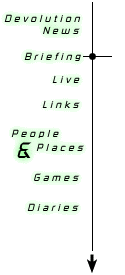
The Politics of Devolution - Party policy
The Labour Party

|
Resistance to devolution for Wales was even greater with Labour governments rarely considering to devolve real power to Welsh institutions.
A turn around in policy began in the late 1960s, when the nationalist parties in Scotland and Wales began to gain support. In 1969 the Crowther (later Kilbrandon) Commission was appointed by the Wilson government to consider devolution. Its recommendations were published in 1973. It favoured a directly elected Scottish Assembly and approved the principle of devolution in general. In September 1974 the Labour Government published the white paper, "Democracy and Devolution: proposals for Scotland and Wales" putting forward proposals based on the Kilbrandon Report.
The election of 14 nationalist MPs in October 1974 put pressure on the Government, which had won a majority of only three, to act on its commitment to devolution. A combined Scotland and Wales Bill was introduced in 1976, it was withdrawn and replaced by separate Bills for Scotland and Wales in 1977.
Plaid Cymru had gained their first MP at Westminster when Gwynfor Evans won the Carmarthen by-election in July 1966. This success for the Welsh nationalists was followed in November 1967 by the victory of the SNP's Winnie Ewing in the Hamilton by-election. Both Carmarthen and Hamilton had been considered to be safe Labour seats. They reverted to Labour in the 1970 election. However in the General Election of February 1974 Plaid Cymru won two seats and the SNP increased its number of MPs from two to seven. The General Election of October 1974 brought even greater successes for the nationalist parties: the SNP now had 11 MPs and Plaid Cymru had 3.
The Conservative Party

|
However, the current line is that the union is mutually beneficial and any move towards devolved assemblies for Scotland and Wales would be the first move towards the break up of the United Kingdom. The Conservatives oppose devolution on the grounds that Labouršs plans are ill thought out and could create rivalry and conflict between these parliaments or assemblies and the parliament at Westminster. They also point to questions about the level of representation of Scottish and Welsh MPs at Westminster following devolution (the West Lothian Question). However the Conservative party has said that it will field candidates if a Scottish Parliament and Welsh Assembly are established and that it will not abolish institutions approved by referendums.
The Liberal Democrats

|
In the joint Labour-LibDem Statement of March 1997, the LibDems indicated that, despite their disagreement with Labour's intention to hold pre-legislative referendums in both Scotland and Wales, they would not seek to frustrate or delay the referendum legislation. They will campaign for a "double yes" in the referendum in Scotland.
They feel that Labour's proposals in Wales are not extensive enough and want to see a devolved assembly (Senedd) with powers equivalent to those proposed for a Scottish Parliament, including law-making and tax-varying powers. Despite the policy differences between them on this issue, the Liberal Democrats have said they would campaign for a "yes" vote in the referendum.
Plaid Cymru

|
In the 1987 General Election, Plaid Cymru made its first parliamentary gain from the Conservatives by winning the island constituency of Ynys Mon (Anglesey) in Gwynedd. They currently have four MPs at Westminster, the highest number they have ever had. Plaid's electoral successes have mostly been in the predominantly Welsh speaking parts of North and West Wales, areas that have traditionally voted Labour. Like the SNP, they are a socialist party.
Plaid supported the proposals for a Welsh Assembly put forward by Labour in the 1970s, and were involved in the campaign for a "yes" vote in the Welsh referendum.
Plaid Cymru wants a 'powerhouse parliament' leading eventually to an independent Wales (subject to a referendum five years after the establishment of the parliament). Their version of the parliament would have law making powers, and be elected by proportional representation. They originally dismissed the Labour Party's devolution proposals as inadequate, and argued that independence should be an option on the referendum paper. However, the party's National Council decided on July 26 to support the "Vote Yes for Wales" campaign. The Party Leader Dafydd Wigley said "It is clearly in Wales' interest to vote 'Yes', a 'No' vote would mean that Wales would become marginalised both in London and Brussels for years to come."


